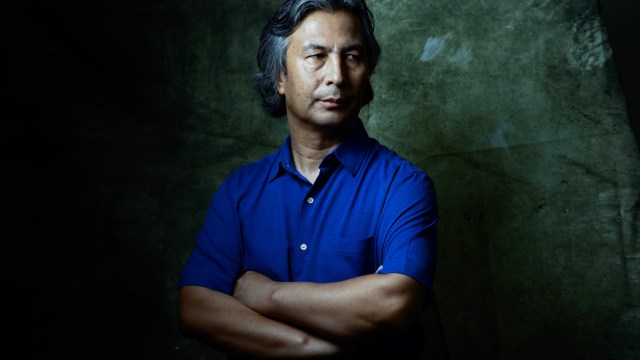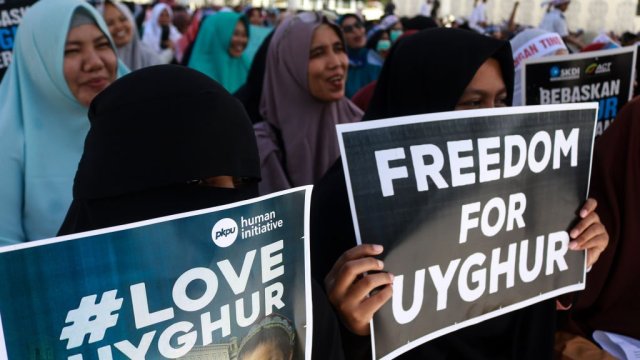
The artists, booksellers, musicians and writers all knew each other well, so greeted each other warmly in the restaurant, cracking jokes as conversations flowed along familiar lines before the poetry readings.
When one mentioned there was a police car outside, Tahir Hamut Izgil ordered two bottles of baijiu liquor to show that they were not devout Muslims. Then two officers entered, stared silently at each person in turn, and later collected all their identity cards. The celebratory mood deflated. “Tahir, let’s not hold events like this any more,” said his shaken novelist friend.
That writer was Perhat Tursun, author of the first Uighur novel to appear in English, who is now serving a 16-year prison sentence for unspecified crimes. Several others at that 2016 gathering also disappeared into China’s sinister network of internment and slave labour camps, thought to be holding at least one million people from the Muslim minorities of Western China. Artists and intellectuals are among the primary targets of Beijing’s drive to eradicate their traditional culture, faith and language, assisted by millions of migrants from the Han majority.
Tahir escaped the crackdown by the skin of his teeth, obtaining passports for his family through a series of fortuitous events and then paying medics so he could lie about one of his daughters needing treatment for epilepsy in the US.
I met this lucky man after hearing him speak and read his poetry shortly before Christmas at a Uighur event in London with food, music and dancing. His freedom is remarkable given the intensity of China’s repression, his high profile as a prominent poet and a previous jail sentence for attempting to leave the country to study abroad.
Afterwards, I was given his book, Waiting to be Arrested at Night, and devoured it in one night. It is a stunning work with its lyrical prose and elegiac translation, a page-turner that stands alongside any thriller for the skill with which it builds tension as a noose tightens round an entire community. We know the grotesque conclusion to this depressing story. Yet the power of his prose comes from its restraint, discarding the usual brutality in books about genocide to focus on the smaller-scale story of one man struggling with his family and friends to comprehend the chilling darkness descending around them.
This delivers a warning on our turbulent planet that no one can predict the future with certainty, however obvious the unfolding of events might seem when looking back into the past. It echoes to some extent the brilliant Defying Hitler: A Memoir by Sebastian Haffner, another gaze into unfolding barbarism that gives real-time insight into the rise of Nazism, reminding us that the first country they conquered was Germany and ultimately begging the question of how you might respond if democracy dissolved into dictatorship. Both memoirs are horror stories in miniature. And both have chilling resonance in our conflict-riven world and divided societies.
On the first day of January 2013, Tahir was called by an academic friend in Beijing who said Uighurs should feel optimistic since Xi Jinping was becoming president. This professor reflected the naive belief in both China and the West that this new Communist leader might turn out to be relatively liberal. “These were hopes born of desperation, a battered community’s daydream of better treatment by its colonial rulers,” writes Tahir.
Xi soon revealed that he is a hardline nationalist, ramping up the repression to strangle their culture. Mosques were razed, cemeteries destroyed, children indoctrinated, traditional names changed, books banned, radios confiscated, families forced to move. Then the disappearances began.
Tahir reveals again the banality of evil. He watches with bemusement as a butcher struggles to cut lamb with a knife chained to a post under an edict to keep weapons from terrorists. “Sometimes I find myself thinking perhaps it’s better to be a cow than a Uighur,” laments one friend.
They speak in code about the “storm” and friends sent to “study” in the camps. When people are told to hand in religious items, his neighbours throw Korans down a drain; one man is traced after trying to dump a copy in the river and handed a long prison sentence. Tahir debates with his wife Marhaba whether to flee but she is reluctant to abandon everything to start a new life abroad in their 40s. “Things can’t get that bad,” she says.
One weekend they take their two daughters to pick mulberries in the country. They get a call from a young woman keeping tabs on their block of flats; like many Uighur graduates, discrimination stopped her from getting a better job so she became a cog in the cruel machine obliterating her own culture.
She ordered them to report to a police station where they had to give biometric data – blood, fingerprints, voice recordings and 3D face images – in the harvesting of surveillance data for the multiplying cameras and checkpoints on their streets. As the couple walk along a basement, they see inside a cell with a notorious Tiger Chair for torturing prisoners and bloodstains on the floor. “We need to leave the country,” says Marhaba.
This book is a powerful indictment of state terror and the perils of dictatorship while giving a glimpse into a community of intellectuals and a gentle Islamic culture being erased by a dystopian regime. Yet it is also a poetic work about family, friendship, freedom and the anguish of exile, his family forced to pledge never to speak with him again while friends must delete him from their phones.
Tahir knows that they are fortunate, yet still they “burn with guilt” over all those suffering in their tortured homeland. This is the reality of life as a refugee – and a reminder for the world of the savagery taking place inside the world’s emerging superpower.
As he writes poignantly in one poem: “What is it that keeps you from seeing I am still alive?”
